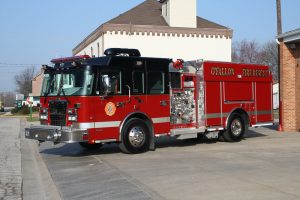Fire, police pensions remain underfunded: Madison has largest deficit
By Bob Pieper For Chronicle Media — February 6, 2018
The city of O’Fallon Firefighter’s Pension Plan is the only fully-funded retirement program for local first-responders in Metro East, according to the Illinois Commission on Government Forecasting and Accountability. (Photo courtesy of Illinois Firetrucks)
Nearly all Metro East fire and police department pension programs remain underfunded, according to “2017 Update — Fiscal Analysis of the Downstate Police & Fire Pension Funds in Illinois,” a report issued last month by the Illinois Commission on Government Forecasting and Accountability.
The report finds the state’s 653 “downstate” police and fire pensions plans — defined as those outside the City of Chicago — are almost $10 billion in debt.
Statewide, the plans have only 58 percent of the funding necessary to pay claims, the report finds.
The commission finds the O’Fallon Firefighter’s Pension Plan to be the only fully-funded retirement program for local first-responders in Metro East.
The Madison Police Pension Fund has the area’s largest deficit with a funding rate of just 18.67 percent, according to the report.
The report notes that, statewide and in Metro East, fire and police pension plans have long been underfunded.
However, 2018 marks the first that the State of Illinois will be able to penalize municipalities for missing pension plan contributions and act to shore up underfunded plans.
Legislation approved by the Illinois General Assembly in 2016 gives the state Office of Comptroller authority to withhold Local Government Distributive Fund (LGDF) payments to municipalities that fall more than 90 days behind on pension plan contributions. The comptroller can then redirect those funds to the town’s police or fire retirement plans to make up for delinquent contributions.
Administrators for some Metro East municipalities say that could result in financial chaos; leaving them with inadequate general funds to provide necessary day-to-day services.
To receive redirected LGDF payments, administrators for local police or fire pension plans must first give notice to the municipality sponsoring the plan and then certify the amounts of the delinquent payments with the comptroller’s office.
The comptroller’s office was expected to issue rules for the administration of the new program by the end of December. The Chronicle was still attempting to obtain a copy of those rules at deadline.
—- Fire, police pensions remain underfunded: Madison Co. has largest deficit —



